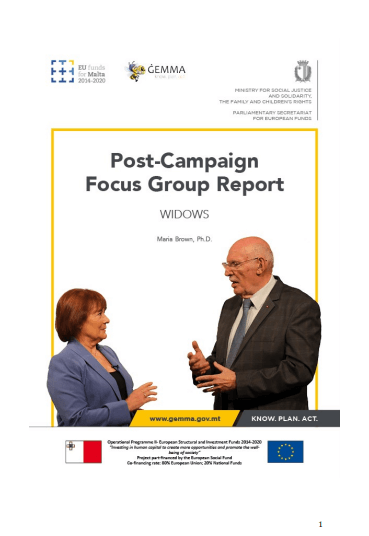ĠEMMA publishes the Research Analysis on the Preparation of an ESF co-financed Campaign on Financial Capability and Widows and Widowers. The Research Analysis report identifies the following key points:
- The expenses of most participants related to household maintenance and healthcare. Only a very small minority mentioned travelling for leisure.
- The financial assets and resources for the widowed household and lifestyle expenses comprise their own pension (particularly widowers) or their late husband’s pension (widows) and personal savings.
- In matters of consumption or service-use, female participants living alone (as opposed to widowers) were particularly vulnerable to abuse (financial, age or sex-based or sexual); a headline finding is that widows are more likely to be financially vulnerable compared to widowers.
- Persons whose spouse passed away, particularly if women or elderly with limitations of health, mobility and digital literacy, are more likely to be attacked by financial scam predators; their financial losses may be related to conflict with or abuse by family members or other persons of trust.
- Responsible budgeting, saving for a rainy day and the distinction between needs and wants featured among the most pronounced trends of the widow/ers group.
- Value placed on saving money and practiced this as much as possible.
- Value placed on having independent accounts and bank cards (independent from former spouse) explaining this was also an asset when having to deal with financial matters, particularly in the period that immediately followed the death of the spouse.
- Expenses related to the passing away of their spouse (including funeral and legal expenses) as well as taxes severely limited their financial capability and they found lack of regard for their vulnerabilities by the legal and the judicial system, as well as by the Government (more generally) because pensions and inheritance are taxable.
- Benefits of having had a will when their spouse passed away as this simplified procedures, particularly in the cases of those who have children.




